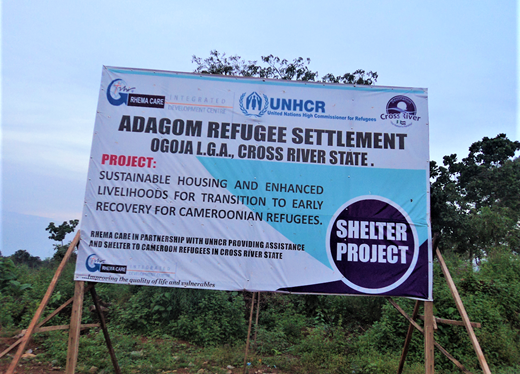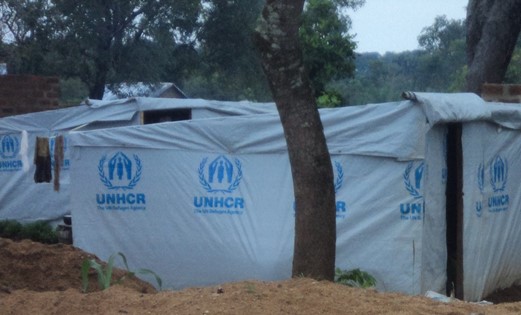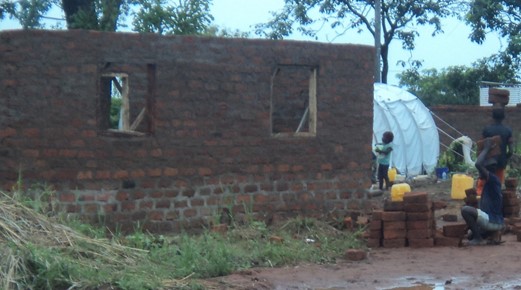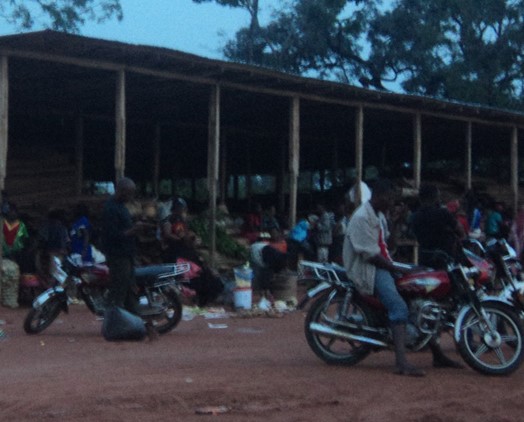Heartbreaking Tales Of Southern Cameroonian Refugees In Nigeria
Cameroonian nationals seeking refuge in Calabar, south-south Nigeria, still have a lot to worry about, from extortion by local security officials to their home country asking for their deportation after labelling them ‘terrorists’.

Francis Nelson (not real name) has mixed feelings about the safety of his family in Nigeria despite running away from the jungle boots of President Paul Biya’s troops on Dec. 18, 2017.
In Calabar, Cross River State, Southsouth Nigeria, where he lives under asylum with his wife and a son, the fear of an imminent arrest and repatriation to Cameroon rattles his mind every night. A supermarket owner back in Southern Cameroon, Nelson lost his grocery store to the crisis.
Since Oct. 1, 2017, when fighting broke out in the Anglophone Cameroon, where the English-speaking minority declared independence from Francophone Cameroon under the name Ambazonia Republic, more and more Southern Cameroonians have fled the country, seeking asylum in Nigeria.
Attacks and raids on villages in Southern Cameroon by military personnel have intensified since the 2018 election when then 85-year-old President Paul Biya, won another re-election—his seventh term in office.
There was an air of uncertainty over them—the event of June 10, 2018, when refugees filed out for food distribution at the Cross River State Emergency Management Agency (SEMA) office and a letter came from the Cameroon Consular addressed to the director-general of the agency asking that the refugees be arrested. Nelson, a father of one, says this has kept his countrymen in constant fear.
“A letter came from the Cameroon Consulate to the SEMA Director General stating that we who were there as refugees are not refugees but terrorists, that we should be arrested and sent back to Cameroon. When this information got to us, we were afraid, there was panic among us,” he recalls.
That in a way is a nightmare—Nelson says, but the nightmare got compounded when Nigerian security personnel restricted the movement of refugees within the country despite an Identity Card issued by the National Commission for Refugees, Migrants and Internally Displaced Persons (NCRMIDP).
Refugees, he says, now provide veritable means of extortion for the security officials.
“Freedom of movement of refugees has been a problem. We can’t move from town to town freely. Even with your yellow card, certificate of asylum issued by the National Commission for Refugees, they still stop them and tell them that they are not supposed to move within the country. Most times they extort money from them – sometimes, people pay as much as N30, 000. It is a big challenge,” he says.
A Protection Officer at the UNHCR office in Calabar who admitted there have been reports of such arrests and extortions says that the agency is holding a series of meetings with the leadership of Nigeria Police, Immigration and the Nigerian Army so that they can recognize the ID card issued by the Refugee Commission.
The allegation is not a one-off experience. Seven Southern Cameroonians who just escaped into Calabar were arrested by men of 13 Brigade of the Nigerian Army. But for the intervention of the Refugee Agency, they would not have been released, Nelson says.
He says the seven were suspected to be Anglophone combatants, “because of their dressings.”
“The clothes they wore were not very clean because they had travelled through the bush out of fear. When they got here, they didn’t have any other dress to change to, they were looking dirty and they came in a group, so they thought they were combatants.”
Intimidation comes from all angles for them; they allege that men of the Nigerian Immigration Service also declined to recognise the Identity Card issued by the Refugee Commission.
“The Immigration intimidates us most often, they claim not to recognize us, sometimes we have to call the UNHCR staff,” says a representative of the refugees in Adagon Refugees Resettlement, Ogoja Local Government who did not want to be named for his safety.
But the refugees are unhappy that their plights have not received deserved attention from the international community and the media. Quite frankly too, talks about the crisis between Francophone and Anglophone Cameroons have not gained prominence among world leaders.
The refugees’ representative, a former French-English translator in Cameroon, wonders why “nobody in the international community is talking about their plights.”
“I think Paul Biya has a very strong Mafia among the AU and they are doing everything in his favour.”
According to him, the recent victory of Biya in the general election dashed their hope of any quick resolution of the crisis.
“We thought the opposition would win the election because that would have offered some hope of dialogue and perhaps a settlement.”
The return of Biya has led to more clampdown in the country− his immediate actions show that he is not working towards any immediate resolution, he says. “Last night, a journalist was arrested and those that are in detention, we don’t know what he plans to do with them.”
He lamented that major international media have not given their crisis the required attention.
“When you look at other revolutions going on across the world, they are prominent in the news, but you don’t hear about the Southern Cameroon issue,” he observes.
“The big international media have not given it prominence in their reportage; is it because we are black? The battle is only fought on Facebook by Facebook warriors.”
Tens of thousands of Southern Cameroonians have fled the country in the wake of the clampdown by the Francophone Cameroonian government since the former declared independence under the name Ambazonia Republic.
‘Over 30,000 Southern Cameroonians Currently In Nigeria’
Over 30,000 of them are currently under asylum in Nigeria−Cross River, Benue and Taraba states−according to the National Commission for Refugees, Migrants and Internally Displaced Persons and UNHCR.

On a daily basis, the population of Southern Cameroonian refugees in Nigeria keeps multiplying, said a senior official at the NCRMIDP.
He reveals that the Commission registers refugees, issues them identity cards and “the refugees keep coming as the crisis continues.”
Many more are running away from their homes as government forces keep arresting dissidents and setting villages ablaze especially after the president won the election for the seventh time.
Data obtained from the office of UNHCR revealed that there were 23,620 refugees as of Oct. 31, 2018, in Cross River State. Of these figures, 10,386 of them were male while 13,234 were female. While there were 333 births since January that year. The number of children among the refugees stood at 11,514, according to the UN agency.
By the middle of Oct. 2018, there were about 28,000 of the refugees registered by the Nigerian refugee commission, an official revealed. “We have close to 28,000 registered refugees,” he says, “but the registration is ongoing if we give you a figure today it may increase tomorrow.”
“This is not necessarily the true reflection of incoming, they are still coming. There are some who do come and do not report here but just settle in the nearby village,” adds the official who also pleaded for anonymity.
However, as of early November, a top staff of the UNHCR who would not want his name mentioned revealed that the figure has moved to 30,000.
Of the over 30,000 refugees, 5000 of them are currently at Adagom Settlement in Ogoja and over 60 per cent of them are children of school age, some of whom are separated and unaccompanied. Those identified are kept with foster parents in the settlement.
When Will This End?
No morning is normal for Peter Bidget (not real name) after gendarmeries in 2017 killed her father and arrested her husband — he is kept in a prison in Buea.

October 7, 2017—at 3 pm, a helicopter loaded with government forces landed in Daddi village in Akwaya, Manyu division. Everyone in sight was shot at and killed, Bridget, a mother of two, narrates.
Ever since, she keeps wondering if she will ever see her husband again, or if her life will ever remain the same. “Right now, I don’t know how he is doing, I know that the situation with him is not an easy one,” she says with wet eyes.
“My husband was arrested by the gendarmes on his way from the farm because he didn’t know what was happening in the village.”
On other days, she feels terrified by the memories of what has happened in her village and again, the recurring fears that the government may come after those of them under asylum in Nigeria.
In Calabar where she hopes that life can again be better for her, Bridget admits coping has been somewhat herculean with two kids and an elderly mother to cater to.
“When will this end?” she asks, staring helpless and hopeless into the ceiling of the brightly lighted room she is sitting. And as if this journalist can help alleviate our pains, she quips, “Please if there is any way you can help me, you do.”
Like the mother of two, life is becoming more hopeless for Monday Henrietta (not real name) and her four kids.
A look of anguish sweeps across her face at the thought of the fate of her husband whose whereabouts has been unknown after he escaped arrest by government troops on June 9, 2017. After two arrests and two detentions with her six-week-old baby, she escaped through the forest to Nigeria via Ikom, Cross River State.
Each time she was detained, Henrietta spent between five and 10 hours in detention for two days when her husband could not be located. “I was arrested and detained for two days,” she says, “I wasn’t thrown into the cell because of the baby.”
Her baby ended up with a respiratory infection after those two days of exposure at the veranda of the military detention facility.
“That exposure let my baby contract a respiratory disease diagnosed by Dr Ebnagha of District Hospital, Manfe,” she recalls.
The couples and their children were living in Manfe, Manyu, South West Region, but Monday, her husband was on the targets’ list of the government for his involvement in the struggle for independence.
He was a member of the opposition party, People’s Action Party in 2011 and was arrested on Jan. 21, 2017, by gendarmerie on allegations of hostility against the nation.
But the mother of four is still uncomfortable despite being in Nigeria because, according to many of the refugees, the Cameroonian Consular in Nigeria has designated them terrorists.
There are claims of arbitrary arrests of refugees by Cameroonian forces. Every day, she wakes up with the fear of arrest and extradition by the Cameroonian government.
“I’m still afraid to attend meetings or interact for a long time and the fact that the Cameroon Consular office is in Calabar which I know and convinced they are working with the Cameroon government.”
“They may be sending spies to monitor refugees’ movements and activities so that they can arrest and extradite us,” she says as her voice cracks with fear.
Tears And Hopelessness
After sleeping on a mat throughout the period of her pregnancy, 23-year-old Lucy finally gave birth to a healthy baby boy sometime mid-Oct. 2018 at a hospital in Ogoja. “I slept on the mat until I gave birth,” she says.
With a three-week-old baby in a Refugee Settlement and among over 30,000 Southern Cameroonians under asylum in Nigeria, the crisis back home casts a bleak shadow over her future and that of her newborn.

For her, it was miraculous that she gave birth to a healthy baby without complications because, according to her, she did not attend any ante-natal clinic during pregnancy – and living conditions at the settlement made the prospect of any easy delivery doubtful.
But Lucy was lucky; she and her baby are healthy, though help from the United Agency for Refugee did not get to her when she was in labour pains and eventually delivered a baby at a hospital.
She couldn’t get a mattress from the agency, because, “mattress is given based on the family size,” an official of the UNHCR said. “It’s one mattress per a family of five and below, the rest are mats.”
With her baby, she shares the temporary shelter that has just a mat and a blanket with her younger sister. Her shelter is among the 140 just constructed by the UNHCR.
The young mother was writing a final Advanced Level examination to proceed to the university when she and her family fled their home.
After a perilous journey through forest and river, Lucy in early-stage pregnancy made it to Nigeria on Nov. 17, 2017. Her father was not so lucky— he died in the forest of shock, the second day of their escape from home.
With the help of fishermen, she alongside her mother and sister sailed safely to Nigeria. “It was very critical running with pregnancy, but I had to manage because there was no option,” she says of her ordeals running to Nigeria particularly with pregnancy.
“We had to run to the bush that night. We slept there that night. Four of us, my father, mum and my sister- it was heavily raining. The next day we tried running to cross the border area but we could not make it. I was pregnant then. The next day, I lost my father, he had a shock.”
Suckling her three-week-old son in front of a temporary shelter provided by the UNHCR, Lucy speaks of how her father was declared wanted by the Biya-led government and how critical it was for her running with pregnancy from the gendarmes.
At Umojok in Southern Cameroon, her father was accused by the Francophone Cameroonian government of fortifying young boys with a local bulletproof called “Odeshi.”
Amidst sobs, she says the accusation against her late father – keeping young men who had crossed to Nigeria for Odeshi in his compound to fight government forces – was unfounded.
“Odeshi is a secret cult whereby boys put marks on their body, it is called gun proof. That was what I heard which was a lie; my father did not do such a thing,” the 23-year-old says.
For her and her baby, surviving at the settlement where UNHCR is just helping to erect structures to accommodate the refugees has been very challenging. She lives on handouts from passersby; ´a day never passed me by without food to eat.”
Often, passersby offer her money to eat and take care of her baby. Much of the distributions by the Refugee Agency did not get to her even during pregnancy and labour, she claims.
Meanwhile, late-night delivery of pregnant women has become a frequent occurrence at the settlement despite the absence of adequate means of transportation to a nearby health facility. There were 15 deliveries in the last two months at the settlement, an official of the camp said.
“Some of the babies died; some died after delivery while some were stillbirth due to poor health care services at the settlement.”
There are other new arrivals who are pregnant and without tents yet. “They sleep in the hall and they eventually deliver, we have some cases of them. They are forced to sleep on the floor and their newborn babies,” he says.
Birthrate at the settlement is overwhelming the refugee agency which has stopped distribution of baby kits to nursing mothers because there is a shortfall in the provision of such too. The leadership of the refugees revealed that the agency no longer distributes baby needs to nursing mothers in the settlement.
“Before they were doing their provisions to make sure that they provide for baby needs, but now, they no longer set their eyes to that direction. When a woman is pregnant, they no longer care to say take these baby kits, even one single thing,” one representative alleges.
“It’s something I cannot actually explain, but when we questioned them, they said, the provision is not there and sometimes, they said the birth rate is too high, they don’t encourage such situations within the settlement.”
Save the Children, an organisation that focuses on child protection, child poverty, education, health, was involved in the provision of baby kits for pregnant women and nursing mothers among the refugees, but has not resumed such gesture since refugees moved to Adagan Settlement in Ogoja. What was provided by the Southern Cameroonians in the Diaspora at the inception of the settlement has also been exhausted.
This investigation was conducted in 2018. But there have since been little improvements. As of Feb. 2020, the total Cameroonian refugee population in Nigeria according to the UNHCR was about 60,000. In a report, the agency said that some of the refugees arrived across the border with gunshot wounds. Quoting the new arrivals, it added that most of them come from areas near the border and have trekked across the savannahs forests to reach Nigeria.
Support Our Journalism
There are millions of ordinary people affected by conflict in Africa whose stories are missing in the mainstream media. HumAngle is determined to tell those challenging and under-reported stories, hoping that the people impacted by these conflicts will find the safety and security they deserve.
To ensure that we continue to provide public service coverage, we have a small favour to ask you. We want you to be part of our journalistic endeavour by contributing a token to us.
Your donation will further promote a robust, free, and independent media.
Donate HereStay Closer To The Stories That Matter




